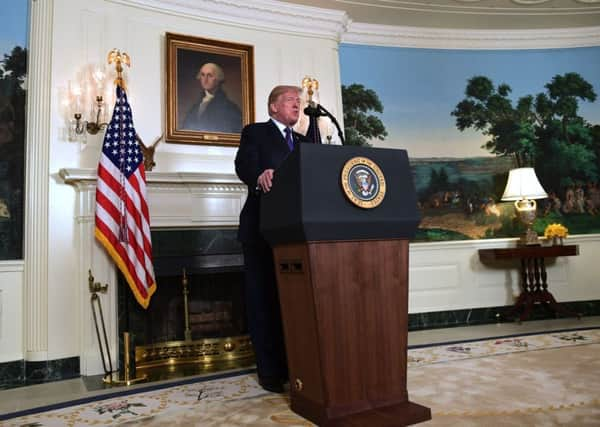Andrew Vine: Truth be told '“ fake news is threatening democracy


It features a clumsily doctored picture of Deborah Meaden, one of the panellists on the BBC programme Dragons’ Den, showing her with a black eye above a screaming headline exhorting me to click on it to find out what happened to her.
Of course, I haven’t, however often it pops up on websites, because it’s obviously complete rubbish and almost certainly linked to some sort of scam.
Advertisement
Hide AdAdvertisement
Hide AdBut I’ll bet a lot of people have, and in doing so they will have been sucked a little deeper into the murky world of fake news.
Just how murky it is will be explored by the Department of Culture, Media and Sport Select Committee later today, a sure sign that this relatively new phenomenon, not really recognised until a couple of years ago, has grown into a real threat to democracy.
It really is that serious. The responsible mainstream media, whether in print, broadcast or online is being undermined by a torrent of fake news that is sowing uncertainty in the minds of many over just what they can believe or trust.
And without a trusted, impartial media to hold power to account, whether at local or national level, the fabric of democracy is put at risk. In the most extreme examples, entire populations are being deliberately deceived by the cynical deployment of fake news.
Advertisement
Hide AdAdvertisement
Hide AdNo tragedy is too great to be manipulated, as demonstrated by the Russian state media reports that the horrific chemical attack on Syrian civilians was a hoax.
Those same so-called news outlets have constantly sought to muddy the waters over the poisoning of Sergei and Yulia Skripal in Salisbury – even last week trying to undermine the credibility of intelligence proving that Yulia’s emails had been hacked by Russia for years before the attack.
Confusion over what is or is not true has been intensified by Donald Trump’s wearisome habit of bellowing – usually via Twitter – “fake news”, whenever a new claim about the seedier or shadier aspects of his past surfaces.
Whether it concerns alleged extra-marital sex, or business relationships that have the whiff of something not quite above board about them, the US President’s first instinct appears to be to try to cast doubt on their veracity.
Advertisement
Hide AdAdvertisement
Hide AdIn doing so, he’s adopting exactly the same tactics as Russian propagandists. The problem is that as the leader of the world’s most powerful democracy – for good or ill – his influence in sowing doubt over what can be trusted is immense, and potentially much more harmful than a bunch of Kremlin stooges could ever hope to be.
How pernicious the spread of fake news has become in our country was shown by the wild conspiracy theories surrounding the Grenfell Tower fire in London last year.
Even as the authorities were getting to grips with it, allegations of establishment cover-ups over how many died and the causes of the blaze were gaining ground. They have never gone away, as shown by some survivors’ distrust of the official inquiry into the tragedy.
The Wild West aspect of the internet is not suddenly going to stop throwing up plausible-looking sites that draw in the gullible, and the self-perpetuating nature of conspiracy theories that thrive there is only ever going to persuade followers that genuine, reputable news providers are simply part of the cover-up of the real truth, which is still being hidden.
Advertisement
Hide AdAdvertisement
Hide AdAnd the most gullible of all, inevitably, are the young, getting so much of what they know of the world from bite-sized pieces of information on social media.
This is fertile ground for peddlers of fake news, who have no scruple about hoodwinking younger people into behaving – or even voting – in a particular manner.
It is still possible that the election of Donald Trump owed something to this sort of manipulation.
Worryingly, it is increasingly likely that in future elections both here and abroad, at least a proportion of the electorate will cast their votes not after listening to and considering the arguments or pledges of rival candidates, but because they have swallowed deliberate misinformation.
Advertisement
Hide AdAdvertisement
Hide AdThe problem lies in combating fake news. However diligently MPs probe the problem today and in the future, recommending any legislative response is going to be extremely difficult.
But it has to be tackled, and viewed not just as an annoyance, but as a genuine threat to any free society.
Schools have already started teaching online safety, and the time is here to extend that into helping the young differentiate between what is real, properly sourced, news and information and what is fake.
The message that just because something is eye-catching, or believed by online friends who pass it on, doesn’t mean that it is true won’t be easy to accept for a generation which has grown up absorbing information this way. But it’s a lesson they need to learn all the same.